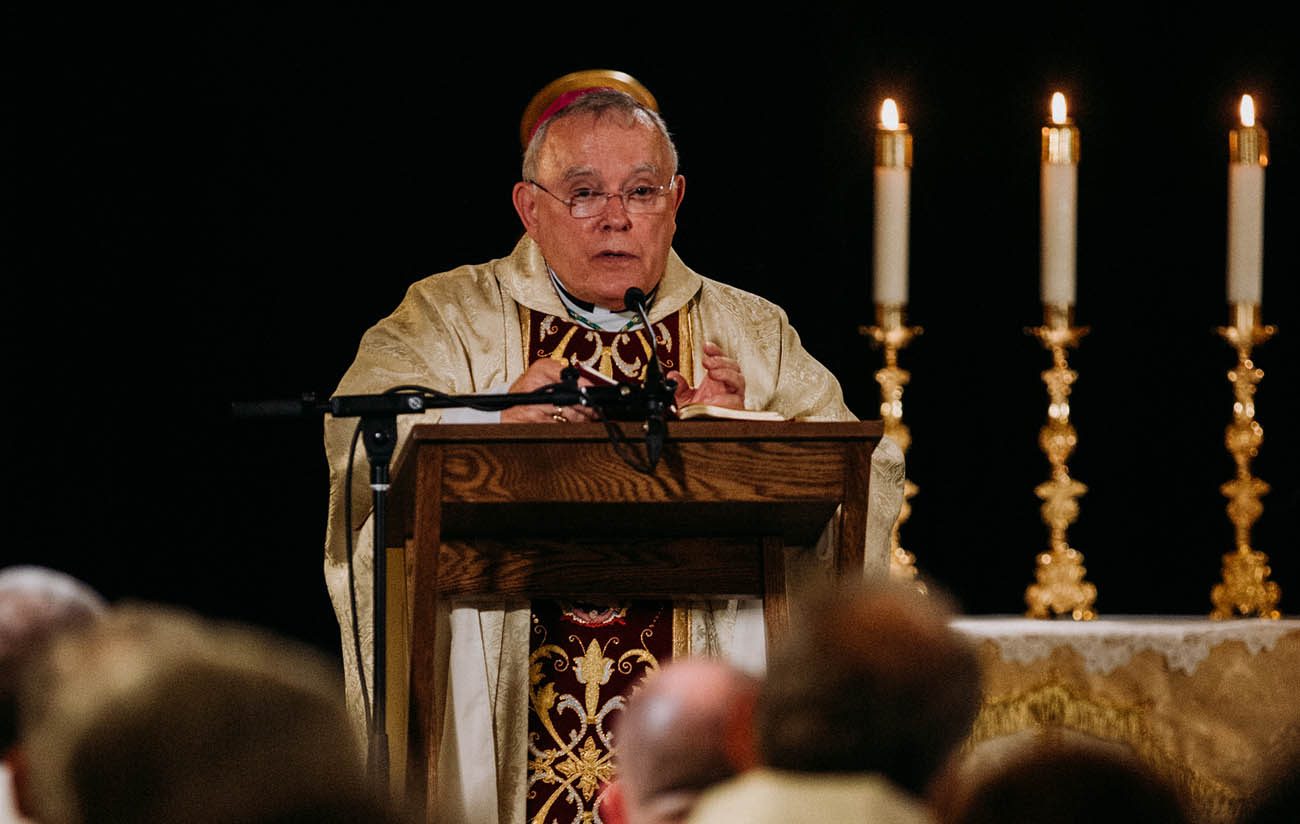
Philadelphia Archbishop Charles J. Chaput speaks during the opening Mass July 24, 2019, at the Napa Institute’s annual Summer Conference in California. Bishops, clergy, women religious and over 500 lay Catholics came together at the conference to discuss religion and the state of the church, to network and to enjoy fellowship with one another. (CNS photo/courtesy Napa Institute)
WASHINGTON (CNS) — Under the clear, California-blue skies of Napa Valley, 15 bishops and 100 priests gathered with over 500 lay Catholics and women religious to discuss religion and drink wine, brainstorm solutions and smoke cigars, not to mention celebrate Mass over 100 times in the span of just a few days.
The Napa Institute, founded in 2010, hosted its ninth annual Summer Conference in late July, focusing on the theme of authentic reform and the current state of the church.
John Meyer, executive director of the Napa Institute, explained the goal of the conference.
[hotblock]
“Faith and culture. We try to look at issues that Catholic leaders face in culture and respond to those issues in a meaningful way,” Meyer told Catholic News Service. “We want people to really be able to articulate why we believe what we believe, and not just what we believe. … We want them to be equipped to win the debate in the culture.”
During the conference, Philadelphia Archbishop Charles J. Chaput, Bishop Thomas J. Paprocki of Springfield, Illinois, Bishop Joseph E. Strickland of Tyler, Texas, and Bishop Thomas A. Daly of Spokane, Washington, spoke on a panel synthesizing discussions at the U.S. Conference of Catholic Bishops’ annual spring assembly in June.
Meyer described the panel as a sort of “State of the Union for the Church.”
Other prominent speakers included Cardinal Raymond L. Burke; George Weigel, a senior fellow at the Ethics and Public Policy Center in Washington; Jim Daly, president and CEO of Focus on the Family in Colorado Springs, Colorado; Alan Sears, founder of Alliance Defending Freedom in Scottsdale, Arizona; former Wisconsin Gov. Scott Walker; and Kristan Hawkins, president of Students for Life of America, based in Fredericksburg, Virginia.
They spoke about the pursuit of personal sainthood, parish reform, transforming culture, engaging young people and responding to church problems at an individual level.
Fran Maier, Napa Institute board member and assistant to Archbishop Chaput, attended the conference this year, and found one topic keenly important.
“I thought the day that was devoted to parish life and revivifying parish life was really wonderful,” Maier told CNS. “The parish is where most people encounter the church and enrich their faith, so renewing the church begins with one person at a familial and parish level. … If you want to renew the church (it) must begin at the parish.”
[tower]
For Meyer, head of the institute, one of the best moments of the conference was Wiegel’s speech titled “This Catholic Moment: Where Are We and What Is the Path Forward?”
“He had a good talk about this moment being unique, but also not unique. The church has always been through these ups and downs and it’s not a time to panic, but a time to be the saint that you need to be,” Meyer said. “Calling people to action was very important this year. Everyone is upset about things going on but looking elsewhere for solutions. But we need to show them that they can be the solution. In the very time and place that they are, they can be the solution.”
Though the Napa Institute is most known for its faith formation, the conference dedicated equal focus to liturgy and prayer, and community building.
Priests celebrated 105 Masses on the institute grounds and in various chapels, including Our Lady of Grapes Chapel and Estate Cave. With 100 priests at the conference, most of whom wanted to say Mass, the desire to celebrate the Eucharist seemed to be contagious. Some services were public, but others served only four or five people in intimate chapels on the grounds of the institute.
The conference also offered a rich opportunity for networking, communicating and making friends. Attendees enjoyed films, theater, food, wine and each other’s company. But the friendships don’t dissolve at the end of the conference.
“We have this infamous cigar night — it’s really just cocktail reception after dinner — where you see all these different apostolates coming together,” Meyer said. “They have a few hours in a very casual atmosphere to discuss things. I don’t want to take credit for things, but we have seen where those things have led to mergers and new promoters to apostolates.”
Fran Maier said one of the critical elements of the institute’s Summer Conference is that it attracts young and old alike.
“The problem is when you get to my age, you get battle fatigue. You think, ‘Oh brother, everything is a problem or about to become one,'” he said. “At Napa you run into a whole lot of young people who are very motivated. There are a lot of young people just getting turned onto issues and (they) bring an entirely new level of energy and enthusiasm.
“For me that’s like someone has turned on the lights,” Maier said. “That’s revivifying. Napa is a transfer point for people who are knowledgeable and have been doing this for a long time but who are tired and pessimistic, and young people who have lots of energy and new ideas for doing things.”
***
Editor’s Note: Registration to participate in the Napa Institute Summer Conference is open to the public, and the institute often awards participants scholarships to help cover costs. To learn more about the institute and its July 22-26, 2020 Summer Conference, visit the Napa Institute’s website here.
PREVIOUS: Opinion on abortion’s legality unchanged; some shifting within groups
NEXT: Final public Mass, tears mark closing of Poor Clare monastery in Memphis


Share this story